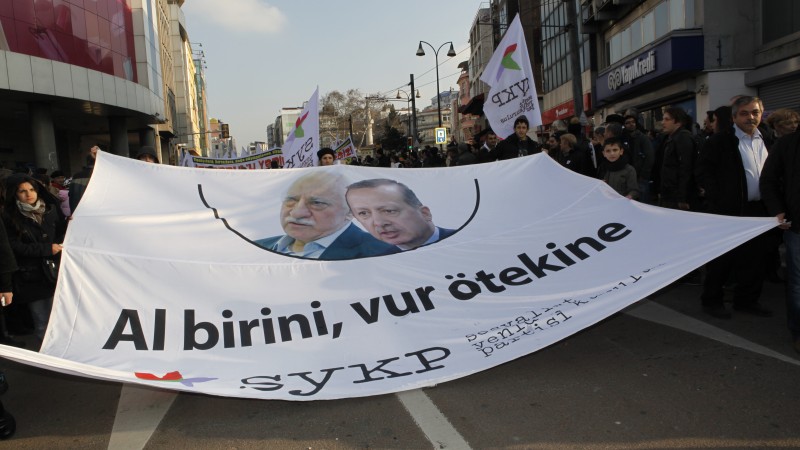
In December 2013, thousands protested corruption and Erdogan's government in Istanbul. A banner with Fethullah Gulen and PM Erdogan's pictures reads “one is no better than the other.” Fulya Atalay for Demotix, image no. 3553279.
Around this time last year, Turkey woke up to the drama of a criminal investigation linking the family and close associates of then-Prime Minister Recep Tayyip Erdogan with the biggest corruption scandal in the country's history. Rather than resign, Erdogan promised to fight the political opponents he claimed were puppeteering the investigation.
So fight he did, in his own authoritarian way.
Fast forward to final weeks of 2014 and Erdogan is now president, as powerful as ever, celebrating a wave of arrests that has alarmed spectators in and outside the country. The arrests have targeted opposition journalists and supposed political supporters of Muhammed Fethullah Gulen, a former ally turned foe, who now lives in the United States. Gulen — a wealthy philanthropist, educator and former imam who inspired the Hizmet movement, is rarely referred to by international media without being described as reclusive — but has attracted admirers the world over. These admirers include policemen, judges and other government officials in Turkey.
Since the graft scandal exploded, Erdogan has been firing barbs at Gulen, whom he holds personally responsible for the darkest months of his political career. This period began with the arrests of the children of ministers in his cabinet in December of 2013 and peaked with the appearance online of an audio-recording of two men whose voices resemble Erdogan and his son, Bilal, in February of this year. In the recording, purportedly from the day the ministers were arrested, the two men discuss how to hide large amounts of money (presumed to be illegally obtained) as an investigation by police (presumed to be pro-Gulen) closed in on Erdogan and his Justice and Development Party (AKP).
Given that Erdogan believes the anti-corruption investigation was the handiwork of Gulen loyalists, the Dec. 14 arrests targeting media workers with supposed sympathies to the educator have the feeling of a long-planned revenge.
Erdogan appeared to sound an official warning of what was to come Dec. 13, when he said:
We are not just faced with a simple network but one which is pawn of evil forces at home and abroad. Whoever is beside them and behind them we will bring down this network and bring it to account.
On the same day, Fuat Avni, a Twitter user claiming to be a government insider warned that police raids on media outlets were imminent.
In the event, 31 people — journalists and police officers with presumed affiliation to Gulen — were arrested. Among them is Nedim Dumanli, the editor-in-chief of Zaman newspaper, Hidayet Karaca, head of Samanyolu TV and Ali Kara, the scriptwriter of the popular and controversial television series, One Turkey. All have been charged with directing and founding and belonging to an armed terror organisation.
According to Human Rights Watch, the arrests are part of a pattern wherein terrorism and coup plot charges are leveled against opposition journalists. Emma Sinclair-Webb, the organisation's Senior Turkey Researcher wrote Dec. 15:
Arresting journalists around the corruption anniversary suggests an effort to discredit and intimidate Gülenist media…The arrests fit the familiar pattern of pursuing journalists for alleged membership of illegal organizations in order to silence critical media.
Relations between the two men were reportedly sour throughout 2012 but dive-bombed Nov. 13 when Erdogan began closing down the former's educational institutions in Turkey. Since Gulen's relationship with Erdogan took a dramatic turn for the worse, it has been much easier for Erdogan loyalists to identify the nation's true enemy.
Earlier this summer, ahead of his presidential election win in August, Erdogan sacked hundreds of police officers and prosecutors, effectively taking the momentum out of corruption allegations against AKP. While the charges against Erdogan's friends have all been dropped, it seems more likely that these new charges — against his enemies — will stick.
On Oct.14, the European Union that Turkey once had hopes of joining, condemned the arrests. Federica Mogherini, the EU Foreign Policy Chief and Enlargement Commissioner, and Johannes Hahn issued a joint statement that read:
The police raids and arrests of a number of journalists and media representatives in Turkey today are incompatible with the freedom of media, which is a core principle of democracy.
But condemnations in the name of democracy are just words that can be brushed aside, while political revenge tastes so sweet.



